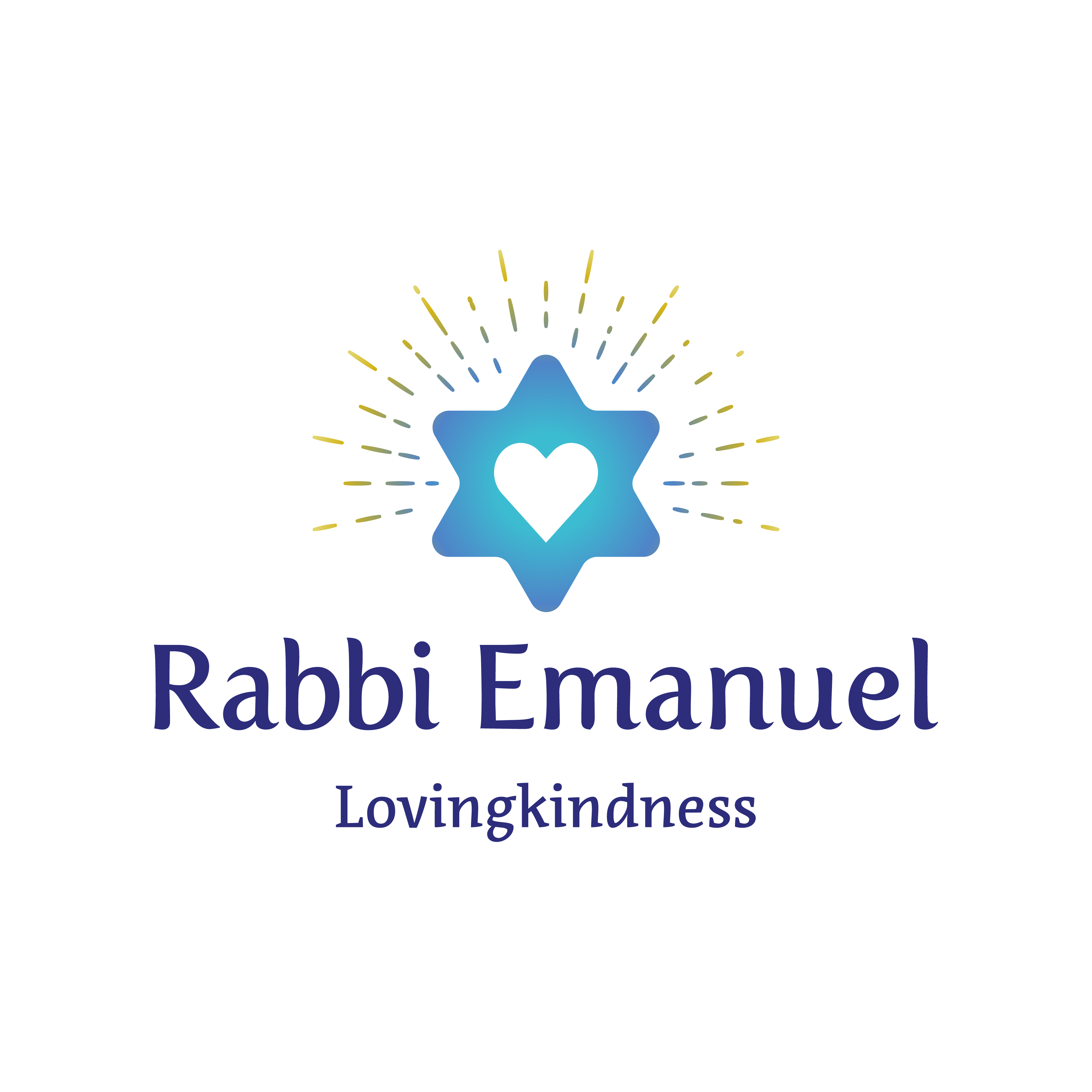Prolog – Some Historical Background of the Family
This story is a difficult one to tell. What to include, and what to omit? How to avid it from being too long and yet keep the significant parts in? These are only a few of the questions I am struggling with. I will try to provide the essential background to understand the spirit of the era, adding links for additional information. Each of my brothers will have a separate section telling essential biographical details. This will lead to how each of them influenced my character and upbringing.
Early Years – until 1936.
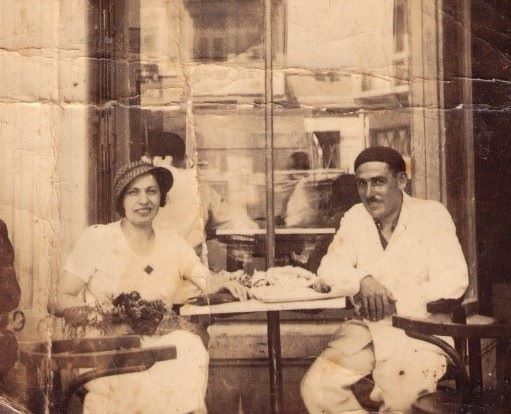
Leah and Arie in Beirut, late 20’s
Our father, Arie, the eldest of 5 siblings, was born in 1902 and lived in Kecskemét, Hungary. He Married Leah Kain, in 1924, got his rabbinical ordination in 1925 and immigrated to Eretz Yisrael (then called Palestine). The first years after their arrival were quiet and peaceful; they even visited Beirut during that time.
Arie and Leah had 3 children: Eliezer (January 1928), Menashe (June 1930) and Yona (February 1934). Leah passed away two years later, in 1936.
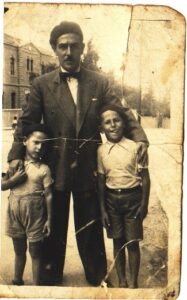
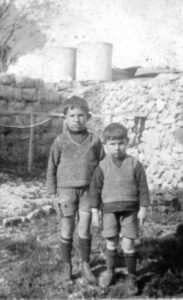
The General Situation in Palestine between 1936 and World War II.
After the riots of 1936-9 (read more) the British Government issued a White Paper, restricting Jewish immigration and land procurement. The Zionist organizations in Palestine rejected that policy and launched a campaign, sometimes violent, against it. Jews demonstrated in Palestine and elsewhere against limiting the immigration of Jews to Palestine, especially after the Kristallnacht horrors.
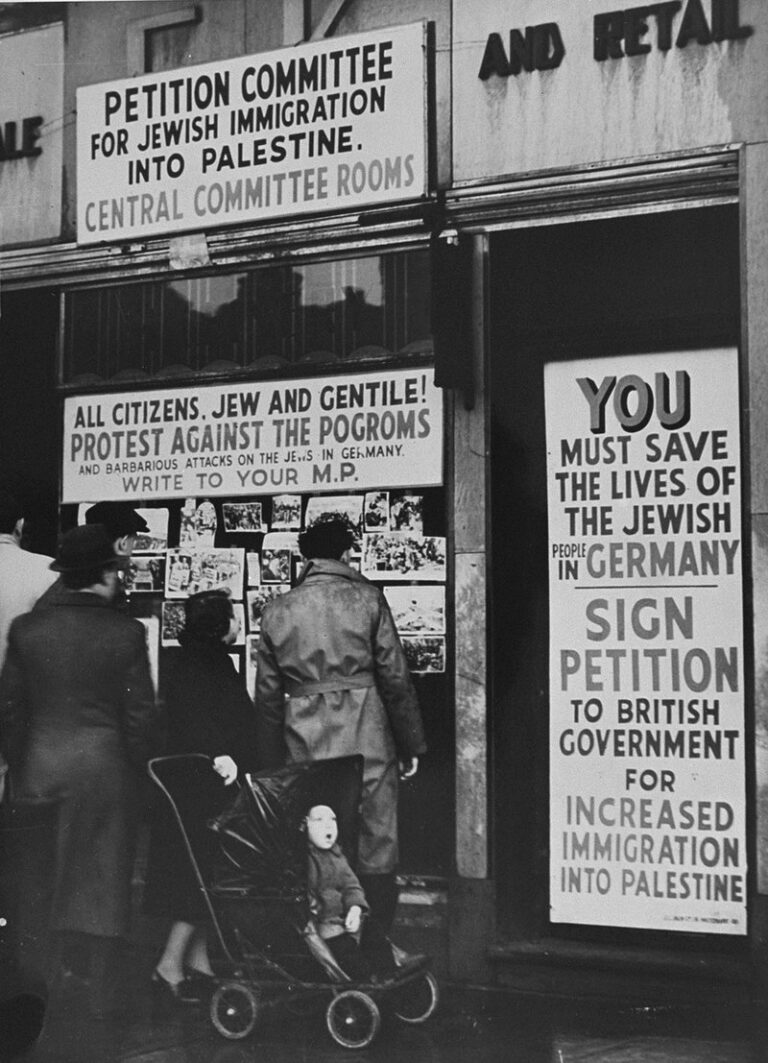
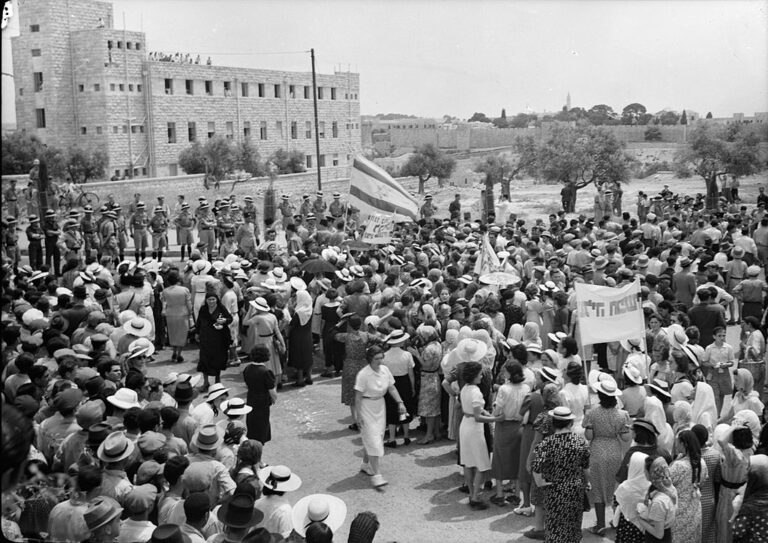
As World War II broke, David Ben-Gurion, then the Chair of the Jewish Agency for Palestine, the governing entity of the Jewish People in Palestine, made the following Statement: “We shall fight the Brits against the White Paper as if there is no WWII, and we will fight with the Brits against the Nazis as if there is no White Paper”. The Jewish Agency launched a campaign that encouraged the Jews living in Palestine to volunteer to the British Armed Forces.
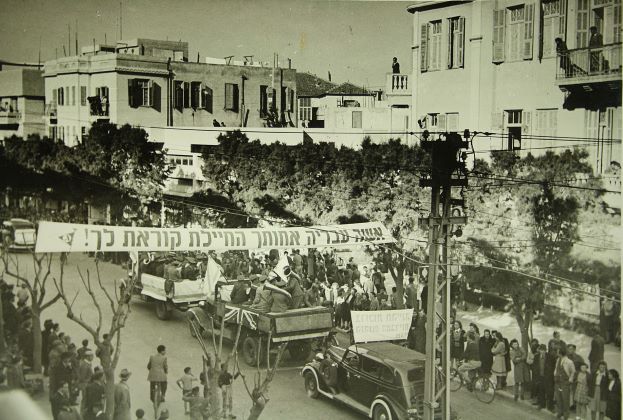
In 1941, facing the progress of the Nazis in North Africa, the British Army agreed to recruit Jews from Palestine. They served the Airforce, Navy, Engineering, Artillery, and even in the Commando units. On September 1944, the British Government established the Jewish Brigade. The Brigade had about 5,000 Jewish soldiers, fighting under both the Union and the Israeli Flags. They fought in Italy, and after the war helped to organize the Jews in camps towards immigration to Israel. The Brigade was disbanded in mid-1946. “In our own hands” is a 90-minute movie that describes the activities of the Brigade and is worthwhile watching.
The Family During Those Years.
Dad responded to the campaign and joined the British Special Constabulary in May 1941 and served for 2½ years. In February 1944 he Joined the Royal Engineers, and served in the Middle East Forces in Egypt, Libya and Italy. He was discharged on July 1946.
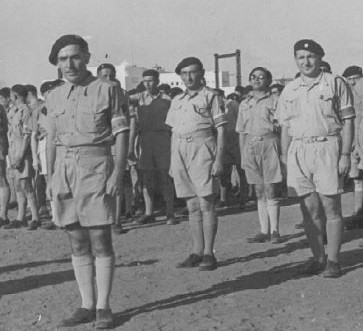
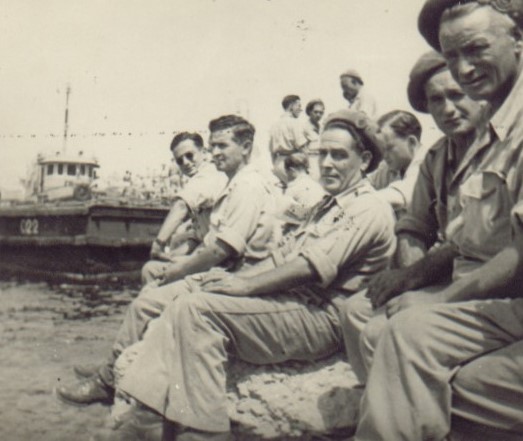
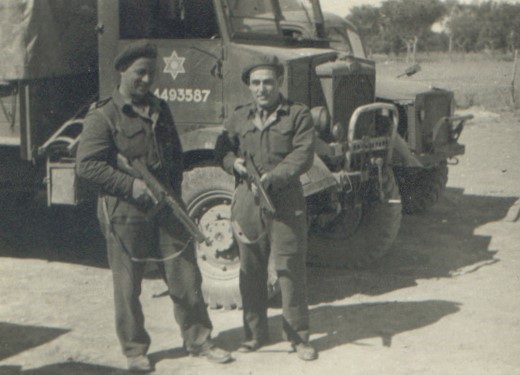
During the years that dad was in service the children were sent to agricultural boarding schools. Eliezer studied in Mikveh Israel, Menashe stayed in Ben-Shemen and Yona studied in the Meir Sh’feyah elementary school.
Menashe
Menashe was a quiet, introvert, person, with a sensitive soul. Little was told about him, and what I know comes from reading his letters and journals that he left. He was reading a lot and connected to the prose he read. He read Tolstoy’s “The Road to Calvary” and felt badly about the horrors of the war. Menashe enjoyed very much reading “The Human Comedy” by William Saroyan. The good and wide-open soul, positive view and the optimism in the future of humanity appealed to him.
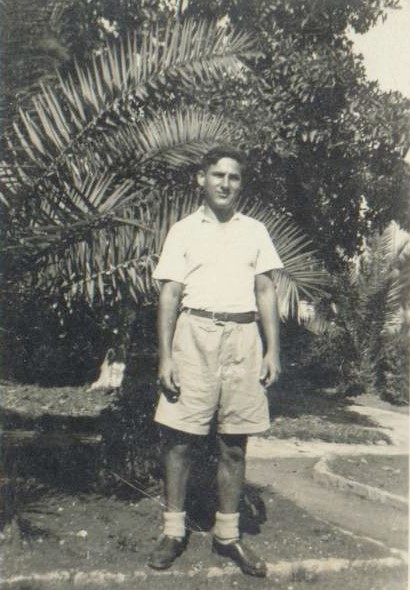
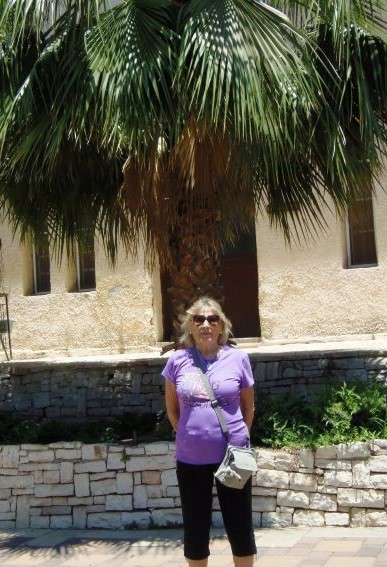
During 1947 the family moved to a farm in the village of Tamra, in the valley of Yizra-el. The farm had about 5 acres (20 dunams) land. Louis Bromfield’s book, “Pleasant Valley”, inspired him professionally and he tried to implement some of the ideas he read about. Menashe was the professional thinker what to grow and how to utilize the land to the utmost. He planned the partition of the farm, the crops to be grown, the number and types of livestock to the smallest details. There aren’t too many in his age group, the work is long, hard and tiring. Yet, he succeeds in finding comfort in the creation he experiences in his work, and optimism through his reading.
A war started after the UN acceptance of Resolution 181, calling to create both Jewish and Arab States in Palestine. Menashe joined the Palmaḥ at the beginning of the hostilities at the end of 1947. He was a radioman in the Second Battalion in the Negev, and his base was in Kibbutz Yad Mordekhai. He wrote a letter to his cousin about the conditions and his hopes at the time.
“The Kibbutz I am at now, Yad Mordekhai, is surrounded from all its sides by hostile Arab villages. Life is not easy. Indeed, we shouldn’t complain, as the food and living conditions are comfortable relative to the possibilities of the Jewish People. Obviously, we do miss some of the very basic and essential needs. We hope that this scarcity will be fulfilled when the Brits will leave the country. As their departure date is comes closer the abandon their neutral stance and cooperate with the Arabs. Yet, we hope to succeed in building our state with the help of the world’s armies of freedom.”
His last letter reveals, as did his previous letter and journals, his demeanor, spirit and optimism, mixed with reality check. He wrote:
“We are already working in escorting convoys with our armored trucks, and it is too “joyful”. There is not a single day that we do not have at least two battles. And for tomorrow, they prepare for us something even more “joyful” and extremely hot (probably Faluja). Let’s hope that we will emerge out of this shower very clean. I am in a very good company and happy with it. We have good food, and that’s OK.
We are too tired from the escort work, that we have almost no energy to read. Besides, there is nothing to read, because the library here is very meager. There are no girls to raise our spirits and we miss home very much; these make our lives very gray. With this hectic pace of live you can’t imagine the yearning to some quiet. To a dress of a woman that will remove the smell of gun powder. We are sick and tired from the eternal honing of swords and talks about kinds of weapons, murders and war… “
Menashe fell in battle on the 24th of March 1948, On Ta’anit Esther, the day of fast just before Purim. He was the radioman of the escort of a convoy to the sieged settlements in the Negev. The convoy entered into a fierce battle at the skirts of the Arab village Barbara. The radio Menashe was responsible for stopped working, and he couldn’t transmit a request for help. Suspecting that the problem was with the antenna, he exited the armored truck in an attempt to fix it. He was shot in his head, and died almost instantly. The convoy continued to Yad Mordekhai, where he was buried.
Eliezer
Eliezer, in many ways, was the opposite complimentary to Menashe. He was extrovert, sociable with a strong sense of humor, tall with a very well-built physique. Unlike Menashe, he acted more out of instinct, and was less academic and a book reader. His imitation of the Lion’s Roar that accompanied the Logo of MGM made him famous among family members and friends alike.
Eliezer did not graduate Mikveh Israel high school. At the end of the 1945 school year, he reported to the British Army recruiting base. He joined the Jewish Brigade at the end of July 1945, at the age of 17½, falsifying his age. After four months of training Eliezer arrived to his posting, Company A of the British Army on the Rein (BAOR). Initially, they were stationed at South Germany and Austria. His military records show that almost upon his arrival, Eliezer went AWOL (Absent without leave) for almost 4 days. And that was not the only instance that Eliezer disappeared. Obviously, there is no record nor knowledge, for the reason of his disappearance. It wouldn’t be far fetched to assume that Eliezer participated in some of the Brigade’s extracurricular activities.
The British Army suspected that individuals within the Brigade executed Nazi officers and collaborators that murdered Jews during the Holocaust. The Brigade was also active in illegal “procurement” of arms for the Haganah and organized Jews to immigrate to Israel. In an attempt to stop these activities, the British leadership ordered the Brigade to leave Italy, Austria and Germany. In the first months of 1946, the Brigade redeployed in the Netherlands and Belgium.
Eliezer was at that point stationed in Antwerp, Belgium. He learned that our cousins survived the Holocaust, and are now in the city, living with their uncle. One needs to remember, that at that time, communications weren’t as easy as they are today. There were millions of people wandering around Europe. Displaced Persons (DP) camps were mostly for non-Jews. Many Jews feared further persecution by those in the camps that assisted in murdering their brethren. The Brigade helped in organizing the Jews in these camps and provided them with material and spiritual support.
Eventually the family and Eliezer found each other and Eliezer visited with them, probably committing another AWOL… One of the cousins, Harry, joined Eliezer to the camp, while the other cousin decided to stay put in Antwerp. Harry told me his recollection of his first meeting with Eliezer. He was so proud to see his cousin in uniforms and arms, with the Magen David insignia on his shoulder. Meeting Eliezer made him believe in life again. Harry was malnourished, short and weighed less than 100 lbs. And here comes his cousin from Eretz Israel – 6 feet tall, well built, strong, and a soldier! It made him proud of being a Jew.
In the camp, Harry learned Hebrew, songs, dances, and so on, with Eliezer watching is back and supporting him. Harry, immigrated to Israel directly from the camp together with Eliezer, that dressed him up with the Brigade uniforms. Shortly after the end of the Independence War, Harry joined the IDF, and served as an Ambulance Driver in the Navy.
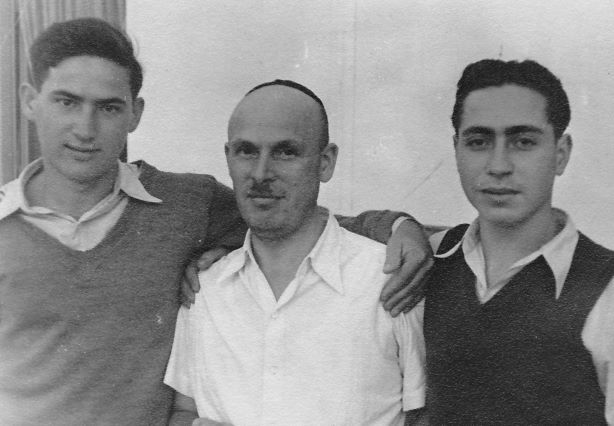
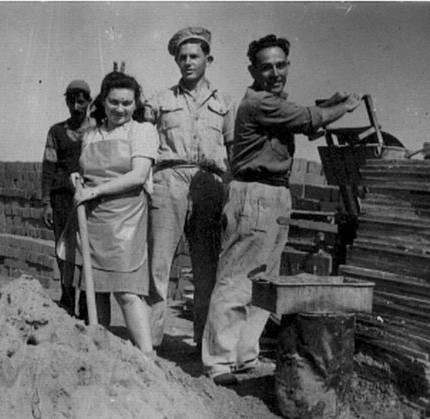
Eliezer came back to Palestine and was discharged in October 1946 and joined the brick manufacturing factory dad had. Later, together with the family he moved to the farm in Tamra. One of the stories I remember hearing about Eliezer in the farm, involved a fight he had with a raging bull. Apparently, he succeeded in stopping the beast and pin it down, until the rest came and tied the bull.
Following the acceptance of UN Resolution 181 Arabs murdered 40 Jewish workers in an attack on the Haifa Oil Refineries. That raised a concern regarding the strategically essential presence of Jewish workforce in the Port of Haifa. There were about 500 Jewish workers and more than 1,500 Arabs. The concern for their safety, and willing to continue working there was real. The Port Company was established, its nucleus came from the Naval Company from the PalYam (the Palmaḥ’s naval branch). The members of the Port Company worked shoulder-to-shoulder with the rest of the Jewish workers at the Port.
Eliezer joined the PalYam and served in the Port Company. During the British Mandate Jews could not carry weapons; finding arms could be a cause for arrest and imprisonment. Eliezer made himself a short club out of a piece of rubber tube filled with lead that I still have. Just before Pesaḥ 1948, less than a month after the falling of Menashe, Eliezer participated in the Battle of Haifa. The Port Company moved from downtown upwards to Hadar, while other Jewish forces attacked from Hadar towards downtown.
After the liberation of Haifa, Ben-Gurion initiated the formation “Naval Service”, the predecessor of the Israeli Navy. The PalYam became the nucleus of this new service, and Eliezer was part of it. The unit he joined in Caesarea was the bud that became later the Israeli Navy Commando unit, Shayetet 13. Eliezer finished his training as a diver and underwater sabotage expert in February 1949, and became an instructor for the following generations.
I was extremely lucky to find, about half a century later, two short videoclips that show Eliezer. One of them depicts Eliezer as he secures the arrival of new Olim (immigrants) to Haifa. The other videoclip shows him marching forward in a line, in a swimming contest.
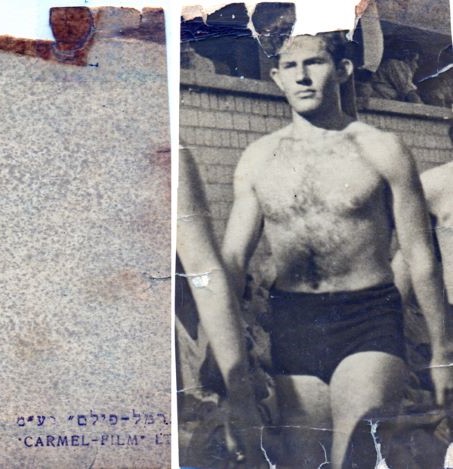
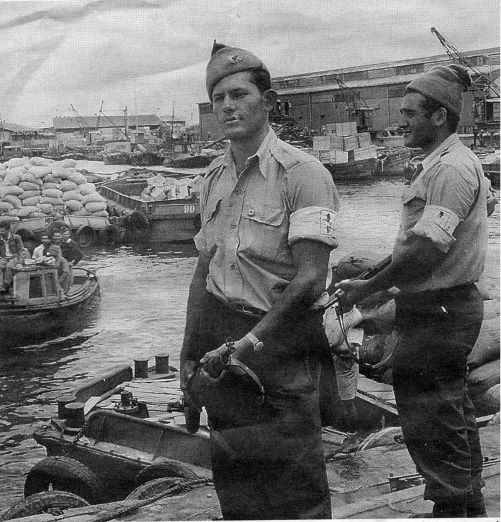
The worst happened on September 20th,1949, a few days before Rosh Hashana and his release from active duty. His unit had a night exercise in the port of Haifa. Eliezer drowned, probably due to a failure in his diving equipment. His comrades found him some 10 minutes after his disappearance. They tried to revive him, as they rushed him with their Jeep to the nearby military hospital. Harry, our cousin, being on duty that night, was summoned to that field hospital. He found Eliezer on a gurney in the Emergency Room, without a breath of life. In Harry’s imagination Eliezer was the immortal cousin that brought life back to him. Harry could not believe that Eliezer was gone.
A month after the internment of Eliezer, Menashe’s remains were brought back from Yad Mordekhai and put to eternal rest next to Eliezer.
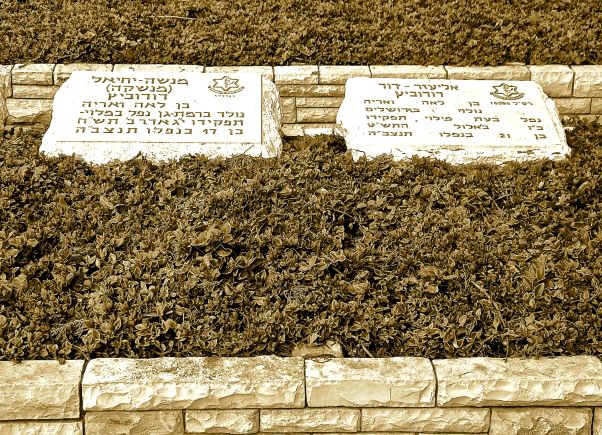
Beloved and cherished, never parted in life or in death!
הַנֶּאֱהָבִים וְהַנְּעִימִם בְּחַיֵּיהֶם וּבְמוֹתָם לֹא נִפְרָדוּ
(II Samuel, 1:23)
Epilog – My Personal Reflection on Their Impact on Me
I was born into their presence, and they were there wherever I looked. Their portraits hung in our living room. My room since I was 8 years old, was a memorial shrine for them. Eliezer friends from the Shayetet visited us at home and we visited them on a regular basis. We were present at the Shayetet Base for every annual memorial service, for graduation ceremonies and inauguration of facilities.
Yohai Ben-Nun was Eliezer’s Commanding Officer in the Port Company and then in the nucleus that form the Shayetet. In 1960 Yohai became the Commanding Officer of the Israeli Navy. He made sure to invite us to visit and sail on the Navy’s destroyers and submarines that just arrived. We weren’t even 10 years old then. I vividly remember being on board of the destroyer INS Yafo, sailing at 20 knots parallel to INS Eilat. To my absolute amazement, I watched how the two ships sailed next to each other, only few yards apart. With awe I witnessed the crew transferring a sailor between the two ships, still going at 20 knots, over a line that connected them.
My decision which high school I wanted to study at was easy to make. It was “Ktziney Yam” (naval officers) in Akko. The application forms included an essay answering the question why I wanted to join that school. My answer, in essence, was that I wanted to follow the footsteps of my brother Eliezer. I wanted to complete the missions that he could not fulfill.
While at school I received leave of absence passes to visit the Shayetet base together with my family. During one of those visits, I learned that the Shayetet used whale hunting boats for training, but not anymore. One of the boats was named after Eliezer and was donated to my school. The boat didn’t carry Eliezer’s name at school, but I knew who she was. As a skipper in later years at school, I tried to take her out as much as I could.
During my service in the Israeli Navy, I had occasional interactions with the Shayetet. One of them that provided me a real and complete closure, occurred while I was already in reserves. It was in the late 1980’s, when I joined the Shayetet teams in an operation. My role was technical in nature, making sure that they can move forth and back safely. The operation was successful and we were on our way back home. We were still out at sea on the evening of Israel’s Memorial Day. At 8pm the captain blew the ship’s horn for one minute, joining the sound of sirens all across Israel. The entire crew stood at attention during that minute, and us, the officers, saluted. In that moment that I felt that I completed a mission that Eliezer could not.
Many years later, Yona my sister and I visited the Palmaḥ museum in Tel-Aviv. In their archives we found letters and additional material about Menashe. One of the documents told that the Ministry of Defense sponsored a scribe to write a Torah scroll to commemorate all the fallen in the Independence War. The document specified Numbers 16:21 as the verse dedicated to Menashe’s memory. This very verse is in my Bar-Mitzvah Torah portion. I didn’t know it during my original Bar-Mitzvah. However, when I celebrated the jubilee to my Bar-Mitzvah the portion I chanted included that verse. Yet another closure.
I recognize that some of my characteristic traits are similar to theirs. Like Menashe, I try to be thorough in my planning, and yet am prepared to face the unknown. I guess that my approach to life and some of my spiritual inclinations are a reminder of him. My tendency to jump forward into action without weighing all consequences is something that would remind Eliezer. Like him, I’d resort to brute force to solve problems that stand in my way when acting in that manner. Their memory and spiritual presence certainly influenced the choices I made, knowingly and unconscientiously, in my life. Telling and recording their stories assures that they both continue living with me, and with those who will read them. My hope is that through this tale one, or a few, will be inspired and appreciate their lives and sacrifice.
